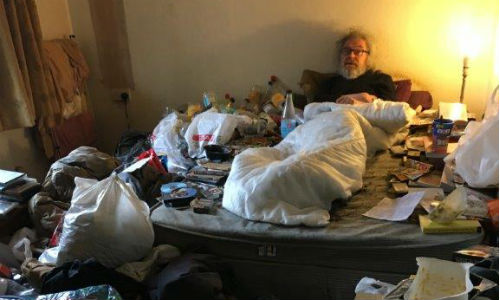Unpacking the myths about hoarding

Hoarding is a word that can be heard in joking conversation or on TV programmes, but it’s often greatly misunderstood. In today’s blog our wonderful work experiencer Niamh looks at the reality of hoarding and how we can help you sort it.
Hoarding vs. collecting

Hoarding is the chaotic acquiring and storing of an excessive number of items. It’s generally different from a collection because the items are disorganised, take up lots of room, and are largely inaccessible or unused.
This might mean, for example, storing newspapers in a pile where they can’t and won’t ever be read.
In most cases, hoarding crosses the line from just being a bit messy when it starts to interfere with everyday living and cause distress for you or your friends and family.
As well as causing physical difficulties at home (taking up space in baths and ovens and causing fire hazards) hoarding disorder can make you feel isolated and disrupt your relationships.
One person struggling with the disorder said, “My family wanted to ‘help’ by turning up with bin bags but this caused more upset.” While every house might need an intense clean every once in a while, for hoarders this can bring on a whole range of emotions, even if they’re not being forced into it.
Another person wrote, “I felt like I was making progress. But when I put the empty cardboard box in the bin, I started to cry.”
Breaking the cycle

It’s true that clutter is mostly in the eye of the beholder, so you might take great pride and joy in your 5 different copies of Harry Potter. However, when the stuff taking up room makes you feel uncomfortable or ashamed, it’s possible you’re hoarding. Hoarders often hold strong beliefs about acquiring or discarding objects, thinking for example “I’ll definitely use this,” or “I just need more time.”
Like with many things, it doesn’t help that there are many misconceptions spread by the media and TV. Hoarders don’t just need encouragement to tidy, or someone to tidy for them, because they usually can’t keep their space tidy for long, and the problem returns.
While many studies recently decided that hoarding is a separate disorder from OCD, it can still be linked to or brought on by other conditions, such as depression or dementia.
How we can help
Our award-winning hoarding support project, Outside the Box, is an innovative approach to helping our customers manage hoarding behaviour.
Our dedicated team provide an intensive support service alongside therapeutic intervention (cognitive behavioural therapy) for our tenants who have too many possessions.
Working with partners in the NHS and Fire and Rescue Service, we use a person-centred approach and gradual exposure to help customers to make changes.
If you are a Housing Association or partner interested in learning more about our project, please contact John Kavanagh, social investment team leader.
If you’re an Onward customer struggling with hoarding get in touch


